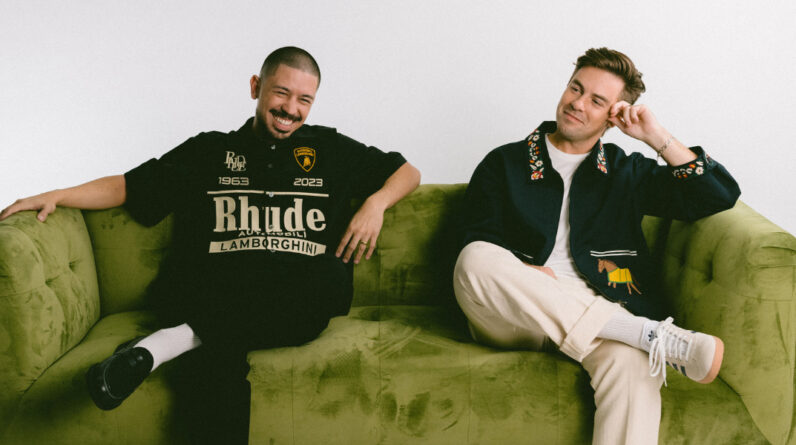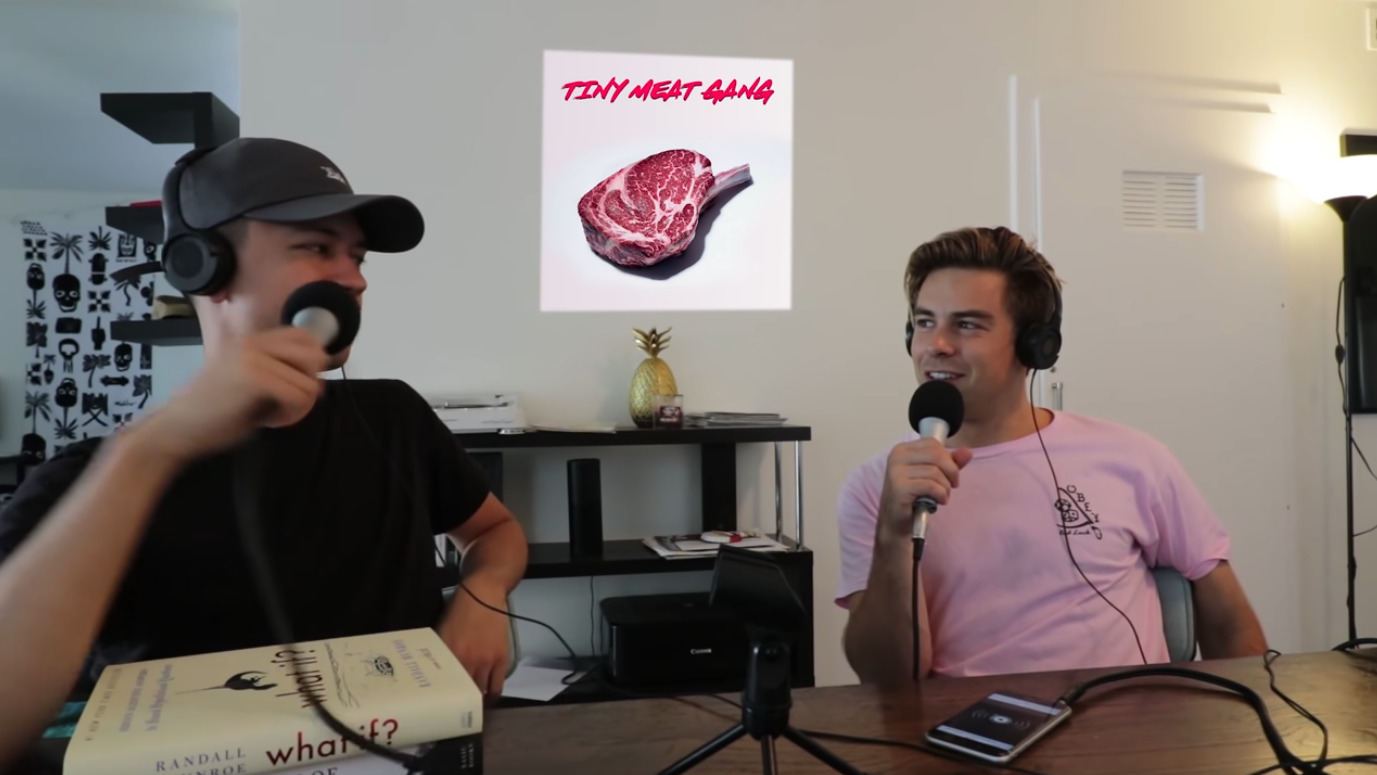
Foundr Magazine publishes in-depth interviews with the world’s greatest entrepreneurs. Our articles highlight key takeaways from each month’s issue. We talked with Cody Ko and Noel Miller about evolving from content creators to business owners. To read more, download the magazine.
—————
At 3am on a weeknight, Cody Ko and Noel Miller found themselves sitting on a couch between Post Malone and Elon Musk. After meeting up with Malone at the Rainbow Bar & Grill in West Hollywood, the two YouTubers accepted the musician’s invite to join his entourage at Musk’s house.
“It’s just us, Post, his folks, and then Elon. He’s literally just right there. And we didn’t say much to him outside of, ‘Hey,’” Ko says. “At some point, we felt it was time for us to go.”
But they couldn’t get out.
“We didn’t know how the hell to get out of there, so… Cody’s like, ‘I want to ask where the front door is,’” Miller says. “That’s how crazy this house was [that] you don’t know where the front door is.”
The two friends walked into the kitchen and found Musk and then-girlfriend Grimes embraced in an intimate moment.
“And Cody’s like, ‘I think we’ll just figure it out,’” Miller says, chuckling as he reminisces about the night.
How did two former co-workers turned content creators find themselves partying at Musk’s house?
By making each other laugh.
Ko and Miller are the creators of the Tiny Meat Gang podcast and TMG Studios, a production company. The duo first rose to internet fame on Vine. They’re now some of the most successful YouTubers in the world, with close to 12 million subscribers across their channels. Their popularity has spawned live tours, stand-up shows, music, and global brand partnerships with companies like eBay.
We chatted with the content creators to learn how they navigated the past decade of internet entertainment to build a business on laughs.
Meat Cute
Watching a TMG production is like hanging out with the class clowns from your high school. Topics range from absurd pop culture commentary to self-deprecating antidotes.
But behind the YouTube lights, Ko and Miller have built their careers with an entrepreneurial mindset—because they had to.
Miller first discovered Ko on the defunct short-form video platform Vine. At the time, Ko had five million followers, including Miller, who worked a day job as a developer.
A few months later, a spot opened up on Miller’s dev team. The new guy was Ko.
“Cody walks in the door, and he sits right in front of me. And our media creation started on our lunch breaks,” Miller says. “You can actually go back and see us looking corny as hell in our early engineering careers, messing around on our lunch breaks.”
In 2016, Vine announced it was shutting down, and Ko was scrambling to transition his audience to YouTube. Miller already had a presence on YouTube doing sketch comedy, so they decided to merge as a unit called Tiny Meat Gang.
“Both of us were creative people and wanted to do stuff outside of just software programming, so we would meet up after work, make videos together, and then make s*** on our own,” Ko says. “And we were able to build an audience that way to the point where we could do it full-time.”
That point also coincided with life circumstances. Miller lost his job, and Ko needed to update his green card. So they decided to make TMG their new job.
In the fall of 2017, they launched their YouTube podcast of the same name, and the collaboration is still the bedrock of TMG.
“When we started our podcast, we both needed an income from this, so we had to do this strategically, and we had to make this work,” Ko says. “That attitude, though, is what has really worked for us.”
“When we started our podcast, we both needed an income from this, so we had to do this strategically, and we had to make this work.”
Then and now, the primary ways to monetize on YouTube are merchandise, ads, and subscription services like YouTube’s channel memberships or Patreon. But Ko and Miller say making a living as a creator requires so much more than checking these boxes.

“You actually want to focus on building that relationship with your audience and figuring out what it is they like about you and how they want to support you versus before. When Cody and I were getting started, I think it was a bit more rinse [and] repeat,” Miller says.
Although their podcast made ends meet through Patreon, it was their reactionary video series That’s Cringe that made TMG a YouTube staple. Reactionary videos are a format where creators film themselves reacting to another video. The series solidified Ko and Miller as elite YouTubers, allowing them to hire agents and gain additional monetization through brand partnerships.
The most successful That’s Cringe installment is five years old. It’s a single shot of Ko and Miller in a half-unpacked apartment, watching and commenting on a fellow YouTube channel called Girl Defined. To date, the video has 33 million views.
“There are people who maybe just got into college [who] are just discovering that video,” Miller says. “I may walk out of the venue, and they’re like, ‘Dude, that Girl Defined video is so funny. That’s how I found you.’”
Miller laughs when fans comment on their old video because he says they were such different people back then.
“If you’re growing and learning and developing, you kind of always have to look at yourself in the past like, ‘What are you doing?’” Ko says.
“If you’re growing and learning and developing, you kind of always have to look at yourself in the past like, ‘What are you doing?’
The self-deprecation has helped make TMG relatable to audiences. But Ko and Miller believe you never really “make it” in entertainment. Instead, it’s all about the next laugh.
“You never really know what’s going to happen, but I think we were willing to keep going until something did happen,” Ko says.
The Network
The popularity of That’s Cringe gave Ko and Miller the positioning to be full-time creators. But they’ve always stayed focused on the business side of the industry.
“There are so many unknowns still in the creator economy,” Ko says. “I think it’s a learning process. From the beginning, for us, we want to make great stuff that people like, and then we’ve got to figure out how to make money from it.”
In their business, the money is a means to the end of a laugh.
“If comedy is our product, then let’s figure out how to bring more comedy and more entertainment to people,” Ko says.
“If comedy is our product, then let’s figure out how to bring more comedy and more entertainment to people.”
In 2020, Ko and Miller reinvested in their product by launching the TMG Network. They built a professional studio and added a cast of new hosts and shows, including The Zach and Wahlid Show, Brooke and Connor Make a Podcast, Trillionaire Mindset, and several spin-offs featuring the two.
“It kind of seemed like this was the next frontier for us. I think we both felt that naturally,” Ko says. “It was like, ‘Well, let’s start a business together and treat it like a business.’”
The concept of a network began a few years ago when Miller started talking on the podcast about his passion for martial arts. Some people loved it, while others didn’t care.
“I said, ‘Oh, what if we created a tier on the Patreon and we start producing different segments?’” Miller says. “Then I very distinctly remember Cody saying, ‘Oh, like a network?’”
They tabled the idea, but by 2020, it made sense to go all-in on the network structure.
“Instead of at the end of the year taking the money that we made as a dividend, let’s try and reinvest it back into the company and build this thing so that it can outlast us,” Ko says.
Expanding into a network meant growing the team to 30-plus people, a far cry from the simple setup in their apartment back in 2017. Running a network also puts more weight on Ko and Miller’s creative decisions and risks.
“At the start of any new venture, it’s scary, and I think it should be,” Ko says.
“At the start of any new venture, it’s scary, and I think it should be.”
The investment included multiplying their editors and producers to take the load off the production work, which Ko and Miller previously did themselves.
“When we started our podcast, it was just us. We were doing everything. We were buying the gear; we were doing preproduction,” Ko says. “I’m grateful that we did that because it taught us how to make a great show from the ground up, so we knew the ins and outs of what it takes to do that.”
Scaling to a network meant Ko and Miller could focus on being on-camera and in business meetings.
“That’s something that people sometimes don’t realize when they see someone posting super often,” Ko says. “They don’t see the infrastructure behind it that allows you to do that.”








